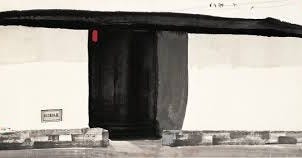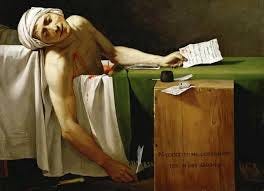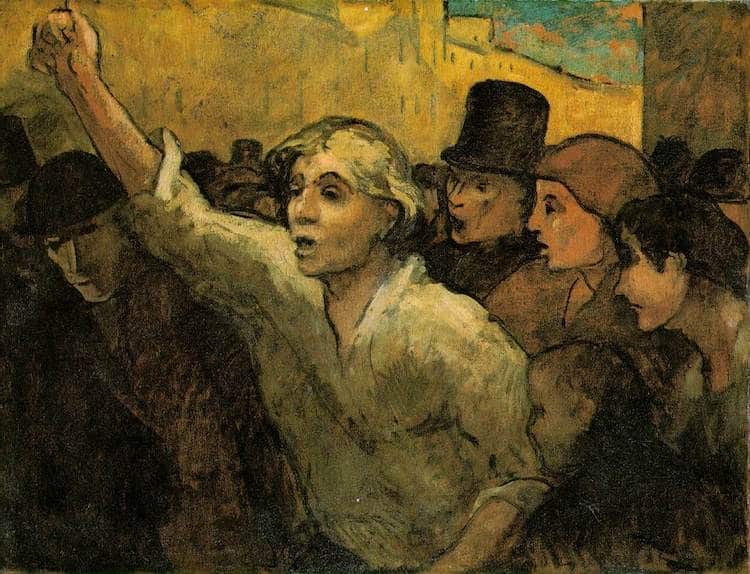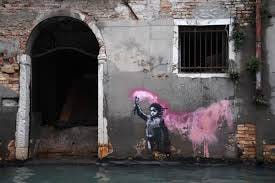Creativity as resistance means to use creative expression to critique power structures, tally human costs, imagine alternatives, and promote resilience in the face of adversity.
In every revolution, the roles of artists and writers and performers are vital. Whether commenting specifically on actions taken by the leading powers, commenting on the life being lived during a period of disruption and unrest, or making fictional art that doesn’t directly comment on the events but illustrates what is on the mind of the artist, art influences how we perceive, respond to, or integrate devastating historic moments.
On a community level, art can communicate solidarity, galvanize people to action, archive cultural record and eventually, help repair a torn society. On a personal level, art affords the artist emotional release, a source of power through voice, a way to promote identity and values.
It’s not the responsibility of every artist to make art in direct reference to the chaos of the moment, but it is vital for the artist to keep creating, to allow their natural creativity to delve deep and bring forth what is on their minds. I feel it’s important to say this because so many writers tell me they once believed it was selfish to write, or that they didn’t have permission to make art. We need artists to make their art. Always and especially in times of overt oppression, fascism, transphobia, homophobia, ableism, science and climate change deniers, etc. (Side note: there is no God-of-Permission other than you, and anyone who tells you otherwise is paying homage to a hierarchy built before all of us were born, and one that does not prioritize those who are not white males of European descent.)
“Now’s the time,” Abelard whispered to himself.I’m a fiction writer, and in one of my stories, Abelard, the main character, must save his brother, who is imprisoned and dying. At one point early in the story, Abelard whispers to himself, “Now’s the time.” This line has always been significant because it’s the moment he realizes that he has to stop just being a young man in a village surrounded by family and friends, but instead face, alone and in leadership, the hardships of life without security and comfort. He has to focus all of his energies, smarts, and personal power on the act of finding and saving his brother and the survivors he’s traveling with. I’ve always been obsessed with war stories because I consider war to be humanity’s greatest failure (and oldest habit). After writing this story, I realized that this moment in Abelard’s life reflects every refugee, migrant, immigrant, or occupied person’s life, where they no longer get to focus on the daily ordinaries, but instead must turn all of their life’s energy to facing a deeply hostile unknown that is against them, ideologically, but also personally.
Similarly, in the lockdown summer of 2020, I found myself writing a story about a monster iced into her cave alone with her ideas and memories. That story reflects one woman’s experience of severe isolation during the frantic birth of a global pandemic. Does it matter? It does to me. As the writer, it gave me comfort to use my creativity to describe my experience. As a writer, it stands as evidence of what it was like for people who lived alone in those first months of pandemic. It goes onto the record of the history of that moment. For me. For anyone who reads it.

When I say that creativity is resistance, I am saying that we need all the voices of creativity to weave the human story of the moment. We need the voices to fight against corrupt governments, genocidal monsters, and violent thieves of basic human rights. We need the voices to archive the specific human stories. We need the voice of conscience to speak up and use all the creativity at their disposal. We need you to make your art, whatever it is.

I want to be in conversation about this. If anything in this piece stirred you—if you're feeling the itch to write something, anything, as an act of defiance or healing—I am offering additional free one-on-one consults this month (more than one if needed!). No strings. Just a space for your ideas to breathe and take shape. (I do this work because I love helping people write, but it’s even more important to me now as an human rights activist and a person seeking to make reparations for my Virginia ancestors who owned slaves.)

And if you want more conversations like this in your inbox, please subscribe below. Please feel free to chime in with any comments!





Forwarded this to a few folks who I know are feeling the itch to create as an act of resistance ... hopefully they will take you up on your generous offer. I believe that you'd be the right guide in every case.